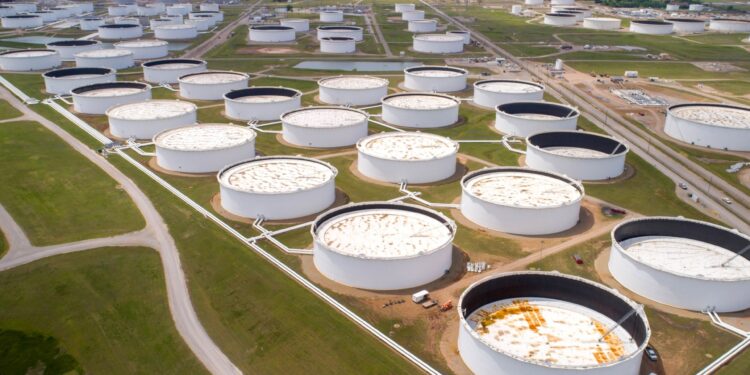Crude oil futures continued to rise – today, Wednesday – supported by the possibility of the OPEC Plus alliance extending or even increasing supply cuts, with Kazakhstan reducing its production due to a severe storm and the decline of the dollar.
In early trading today, Brent crude futures rose to $82.01 per barrel. US West Texas Intermediate crude futures rose to $76.86 per barrel.
The two standard crude oils rose at the end of trading – yesterday, Tuesday – by more than 2% at settlement, and Brent crude futures rose by $1.70, equivalent to 2.1%, to reach $81.68 per barrel at settlement at the end of trading on Tuesday. US West Texas Intermediate crude futures also rose $1.55, or 2.1%, to $76.41 per barrel.
The OPEC Plus alliance, which includes the Organization of the Petroleum Exporting Countries (OPEC) and allies including Russia, will hold a ministerial meeting online tomorrow, Thursday, to discuss production goals for 2024.
OPEC Plus sources said that talks on oil policy for 2024 are difficult, which suggests the possibility of extending the previous agreement and not increasing production cuts.
Oil prices declined last week as a result of OPEC Plus postponing its meeting for 4 days in order to resolve differences over production targets for African countries.
OPEC Plus meeting
“We believe the market’s primary focus is on Saudi Arabia’s continued additional voluntary cuts of one million barrels per day,” Macquarie energy strategist Walt Chancellor said in a note.
He added, “We see that extending these cuts to the second and third quarters of 2024 may represent the threshold for this meeting.”
For his part, Carsten Fritsch from Commerzbank said that one possible settlement may include Angola and Nigeria accepting production reduction targets for a few months in the event that other countries’ targets are similarly reduced.
He added, “According to the delegates, Saudi Arabia is requesting to reduce the production quotas of other countries in OPEC Plus. Although Kuwait has indicated its willingness to do so, some countries appear to be resisting any such step.”
Fritzsche said that the UAE is likely to oppose this step given the increase in its production target for 2024 based on its request when the OPEC+ alliance held its previous meeting in early June.
Oil also received support from the decline in Kazakhstan’s production, as a severe storm in the Black Sea region disrupted about two million barrels per day of oil exports from Kazakhstan and Russia, according to government officials and shipping data. The Kazakhstan Ministry of Energy said that the country’s largest oil fields reduced daily oil production by 56% as of November 27.
Dollar decline
The dollar fell to its lowest level in 3 months yesterday, Tuesday, after Christopher Waller of the Federal Reserve (the US central bank) indicated the possibility of lowering the interest rate in the coming months if inflation declines.
A weak dollar usually supports oil prices because it makes it cheaper for holders of other currencies.
Meanwhile, US crude oil inventories fell by 817,000 barrels last week, according to market sources citing American Petroleum Institute figures.



